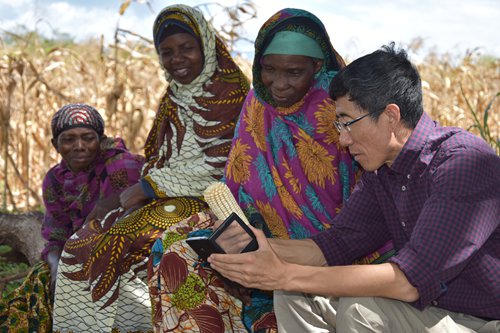
Li Xiaoyun (right) imparts planting techniques in Tanzania in July 2015.
For the past two decades, Li Xiaoyun, a professor at the China Agricultural University (CAU), has devoted himself to eliminating poverty in China's rural areas. As he turns 55 years old, he shows no sign of stopping and has even expanded his reach to Africa.
A doctorate in crop ecology in CAU, Li began to tour the country's poor areas, taking part in efforts to reduce poverty in the mid-1990s. "I'm doing development studies. Poverty relief is a major part of it. Only by going into villages and getting involved can we find solutions," Li told the Global Times in a recent interview.
In 1994, Li and his colleagues, for the first time, drew up a participatory poverty reduction model, which was later adopted by the central government and promoted across the country.
In recent years, he has become more personally involved in this cause. He established a poverty alleviation center in Southwest China's Yunnan Province.
He also took his students to Tanzania to teach the local farmers planting techniques. In the past three years, the corn output in demonstration fields there has increased five folds.
His dedication to poverty relief and charity spirit have earned him lots of awards and titles, as well as many chances to speak at international meetings.
Li believes that mutual aid is fundamental to maintaining basic social order. He likes to quote a verse from the renowned Tang Dynasty (618-907) poet and government official Bai Juyi: "If everybody is warm like me, nobody in the world is cold," saying this is also his wish.

New houses are built in Hebian village in Yunnan with the help of Li Xiaoyun's poverty alleviation center.
First attempts
In 1994, he applied for a 250,000 yuan ($36,000) grant from a German foundation to set up his first anti-poverty project in a town in Yanqing county, Beijing.
Afraid that the funds would be embezzled, he withdrew the cash from the bank and took it to the town himself. At a meeting attended by the county head, town head and villagers, he handed the money to the farmers. Under his guidance, the farmers used the money to build a foundation.
Following international practice, Li asked that the funds be prioritized for the poorest families in order to buy breeding sheep. When the sheep gave birth, the lambs were to be given to other poor families.
However, a series of setbacks have led to the failure of his first project. "During that period, I was beset by problems such as who would be the first candidates to receive the funds, who would receive the lambs and what to do when the sheep die," Li recalled. Some farmers even went to Li's home to make complaints and give tip-offs.
"The sudden arrival of the funds broke the peace in the villages. It also changed their government structure and I, an outsider, became one of the power brokers," he noted.
The lessons learned from this first attempt meant that his project in Yanchi county in Ningxia had somewhat better results. Instead of becoming personally involved, he allowed some literate locals to monitor the funds after giving them specific training.
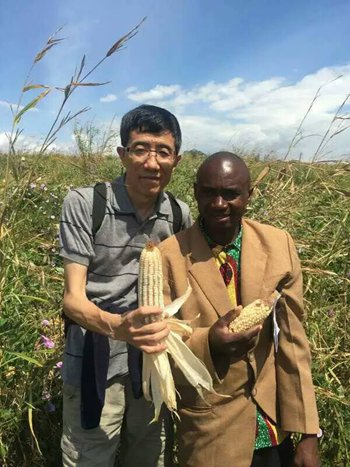
Efforts in Africa
Li has also expanded his research and experiment in poverty alleviation to African countries.
In 2011, the International Poverty Reduction Center in China launched an aid project in Tanzania.
Li and his team played a major role. Besides leading his team in introducing Chinese agricultural development experience to the country's officials and farmers, Li also helped them nurture agriculture experts and invited them to China to receive short-term training.
They also divided into groups to take charge of different villages and households, teaching farmers about the planting density, weeding and anti-drought techniques.
After five years, the China-Tanzania Agricultural Technology Demonstration Centre has set up a chicken farm, a paddy rice field and a vegetable garden, and has become a popular agriculture learning base for local students and farmers.
Several senior Tanzanian officials, including the former premier and president, have acknowledged Li's contribution.
"Chinese development can't be realized if we only rely on input. Exercising the international humanitarian spirit will directly affect Chinese efforts to build ties with the world," Li wrote earlier.
The agricultural technology assistance has been a major part of Chinese aids to Africa. In some African countries, the shortage of food and clothing has been curbed, but poverty still remains a huge problem.
Li believes it is important for China to contribute to poverty reduction on the continent.
"The aids to Africa can show China's exercise of duty and responsibility, create a positive image of China's influence, and relieve the possible obstacles and constriction against us," Li said.
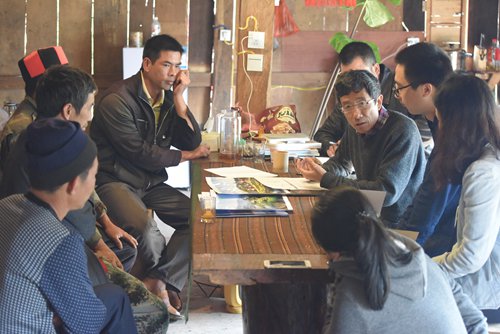
Li speaks with villagers and volunteers in Hebian.
Hebian experiment
His efforts in China continue. In 2015, he targeted Hebian, a poor Yao ethnic village in Mengla county in Yunnan's Xishuangbanna Dai Autonomous Prefecture.
After a half-year survey, Li led his team to Hebian, and officially started the process to relieve the village from extreme poverty by turning it into a forest holiday resort.
"We were quite skeptical at the beginning. We thought that there wouldn't be such a good thing, and even suspected them of being frauds pretending that they wanted to help us get rich," Deng Linguo, an accountant from the village committee, told the Global Times on Tuesday.
After cement roads, sanitation facilities and new houses were built, these doubts disappeared completely.
"We have never been so enthusiastic about getting rid of the poverty that has been passed down through several generations," Deng noted.
In fact, the villagers have already tasted the benefits of the change that Li has brought to them. Last year, through his online shop, Li sold thousands of eggs at a price of 10 yuan each. Eggs laid by free range chickens in rainforests have proven popular among urban consumers.
Since the reform and opening-up drive, China has lifted more than 700 million of its citizens out of poverty. But there are still tens of millions of people living below the poverty line.
He believes this task will be an uphill struggle. But he is convinced that the experiment in Hebian will succeed and can be followed or copied.
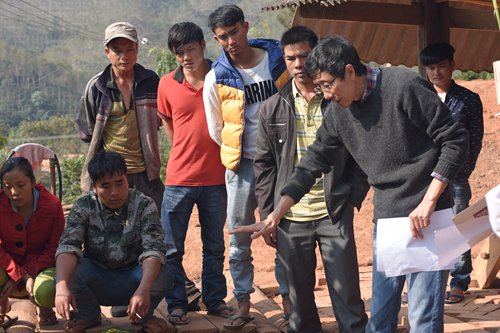
Li offers his guidance at a construction site in Heibian.
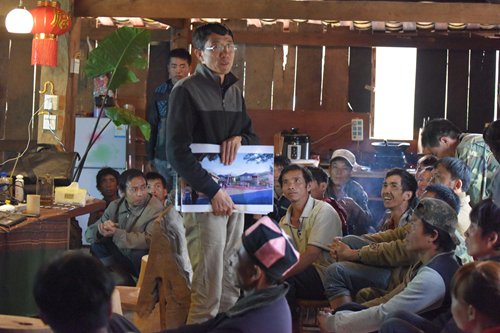
Li explains the house reconstruction plan to the Hebian villagers.

